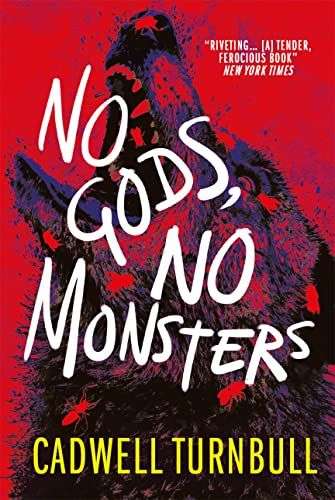We’ve implemented some new protocols around sending us messages via this website. Please email website “at” britishfantasysociety “dot” org for any issues.

For all things fantasy, horror, and speculative fiction
-
Announcement:

No Gods, No Monsters by Cadwell Turnbull from @TitanBooks
No Gods, No Monsters by Cadwell Turnbull
Titan Books, pb, £9.19
Reviewed by Joely Black

One morning in October, Laina finds out cops in Boston have shot her brother. In another shooting, another Black man was the victim of police brutality. Yet there is more to this story. Laina’s brother is a werewolf, and the video shows him transforming into his human form right before being shot. Laina must deal with her grief and the discovery that monsters are real, that they live among humans unseen, and that they are caught up in a fight between conflicting factions for power.
This is Cadwell Turnbull’s second novel, making rich use of allegory to tackle some of the most fundamental issues affecting American society today. Turnbull uses his incredible talent to confront institutional racism and demonstrates how authors can introduce characters from all walks of life with subtlety and grace. Not content with showing how to use the idea of literal monsters as an allegory for those perceived by some as “monstrous” in today’s society, Turnbull also breaks down the individual struggles of people negotiating the intersectionality of their multi-layered identities and how these impact relationships and families. Turnbull takes on everything from being Black to trans, always with empathy and skill.
This book was impossible to put down. The writing is poetic but never overly so and does not detract from the pacing of what is, technically, a political thriller. In almost every chapter, every character deserves an essay on their role in the story and their broader significance. At a writing seminar I attended recently, an editor advised a writing group to avoid tackling any of the current issues faced by our society. Instead, I would recommend reading Turnbull to demonstrate how to do this so well. After all, stories are how we develop empathy for others, confront our struggles and perhaps even find the means to overcome them.
The issues Turnbull is tackling are huge, yet his focus is always personal. He uses the idea of actual monsters to demonstrate that we all face the same difficulties, whatever our interwoven identities. Laina realises that finding the truth behind her brother’s murder will put her life in peril. Her partner attempts to deal with his parents’ lack of understanding of his life choices and the uphill battle to live ethically under capitalism. If this sounds like it might be too much for one novel, Turnbull shows that these multi-layered, personal, and societal problems are the very things that we all face. There is no tokenism here.
This novel is the first of a trilogy. That’s good news because this world where secret and powerful societies wrestle over the future of humanity (monstrous or otherwise) is so compelling that I came away desperate for more. The novel never feels like a mere introduction, and the novel works excellently as a complete story in and of itself. I, for one, can’t wait for the next book.
Explore the blog:
Blog categories:
Latest Posts:
Tags:
#featured (56) #science fiction (25) Book Review (264) events (44) Fantasy (231) Graphic Novel (13) horror (136) Members (62) Orbit Books (48) profile (43) Romance (17) Science Fiction (50) short stories (28) Titan Books (52) TV Review (15)
All reviews
Latest Reviews:
- THE HOUSE ON THE BORDERLAND by William Hope Hodgson
- Monstrum by Lottie Mills
- Mood Swings by Dave Jeffery
- Yoke of Stars by R.B. Lemberg
- Hera by Jennifer Saint
- The Black Bird Oracle by Deborah Harkness
- RETURN OF THE DWARVES By Markus Heitz
- Delicious in Dungeon
- Toxxic by Jane Hennigan
- THIS ISLAND EARTH: 8 FEATURES FROM THE DRIVE-IN By Dale Bailey
Review tags:
#featured (2) Action (4) Adventure (4) Book Review (28) Fantasy (18) Featured (2) Feminist (2) Gothic Horror (3) Horror (14) Magic (3) Orbit Books (3) Romance (6) Science Fiction (5) Swords and Sorcery (2) Titan Books (7)